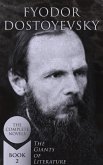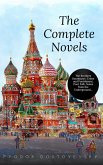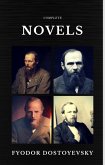Fyodor Dostoyevsky: The Complete Novels (The Giants of Literature - Book 2) is an essential compilation that captures the essence of Dostoyevsky's profound literary journey. Through this collection, readers are presented with a masterful blend of psychological depth, philosophical inquiry, and existential contemplation. The stylistic richness of his prose navigates the intricate landscapes of Russian society, ethics, and the human condition, illuminating the moral dilemmas faced by his complex characters. This anthology not only showcases famous works, such as *Crime and Punishment* and *The Brothers Karamazov*, but also sheds light on the societal transformations that shaped Dostoyevsky's narrative voice during a tumultuous era in Russian history. Fyodor Dostoyevsky, a towering figure in literature, draws upon his own tumultuous experiences, including his brushes with death, political exile, and profound spiritual crises, to create narratives that delve deep into the human psyche. His engagement with themes of faith, free will, and the nature of evil sets the groundwork for modern existential thought, making his novels an enduring source of intellectual inquiry and ethical exploration. This comprehensive collection is highly recommended for anyone seeking a profound understanding of human consciousness and moral complexity. Whether you are a seasoned literary scholar or a casual reader, this anthology invites you to lose yourself in the intricate narratives and explore timeless questions relevant to both personal and collective human experiences.
Dieser Download kann aus rechtlichen Gründen nur mit Rechnungsadresse in A, B, BG, CY, CZ, D, DK, EW, E, FIN, F, GR, H, IRL, I, LT, L, LR, M, NL, PL, P, R, S, SLO, SK ausgeliefert werden.








![Fyodor Dostoyevsky: The Complete Novels [newly updated] (The Greatest Writers of All Time) (eBook, ePUB) Fyodor Dostoyevsky: The Complete Novels [newly updated] (The Greatest Writers of All Time) (eBook, ePUB)](https://bilder.buecher.de/produkte/48/48716/48716960m.jpg)
